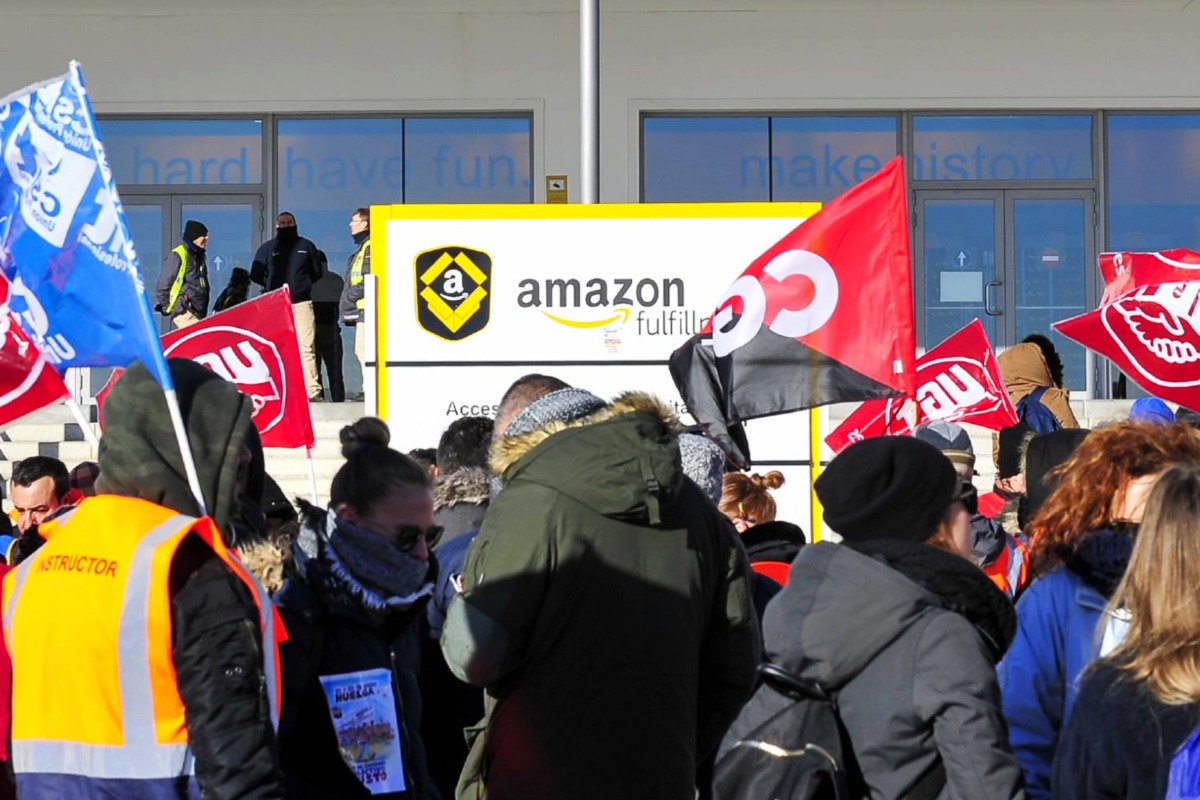Big Tech has been in the spotlight throughout the pandemic, as billionaire bosses get richer, and workers are exploited ever harder. But now tech workers – in the US and UK – are beginning to organise, unionise, and fight back.
The COVID pandemic has many legacies. But one of the most notable has been the rapid growth of the online world, and the tech industry in particular. As people’s lives moved online – from internet shopping to home working – so the profits of Big Tech ballooned.
Amazon’s founder Jeff Bezos has added over $72 billion to his personal fortune since the onset of the pandemic. Elsewhere, Tesla CEO Elon Musk recently became the world’s richest person (and a meme sensation), as his personal fortune rose to $185bn. Once again, we see how capitalism profits off human misery.
Getting organised
Of course, these profits have been gained at the expense of workers: be they white-collar tech employees forced to work ever-longer hours; or warehouse staff and delivery drivers sweating to meet unmanageable targets.
Some commentators have tried to portray this as a ‘new era’ of capitalism. In fact, however, these are the same exploitative practices that have been seen throughout capitalism’s history.
In turn, today’s tech workers are looking to tried-and-tested methods to defend themselves against the bosses’ attacks – namely, organisation and unionisation.
Last year, workers at Google formed the company’s first-ever in-house trade union, called the Alphabet Workers Union (AWU). Earlier this month, the AWU launched a charge against the company, after a worker was fired for speaking out about conditions.
Welcome back to Alphabet, Shannon!
Shannon’s back at work b/c she had a union to turn to when she was illegally suspended. She came to us, we raised hell, & a week later, she’s back.
Alphabet workers, there’s strength in numbers. Join us, organize, unionize.#UnionStrong https://t.co/WAetOWy1yx
— Alphabet Workers Union (@AlphabetWorkers) February 10, 2021
Similar efforts are afoot to unionise Amazon’s vast warehouse workforce. Employees at the BHM1 ‘fulfillment centre’ in Alabama are currently fighting to create the first union in an Amazon warehouse.
Unsurprisingly, Amazon bosses are battling tooth-and-nail against this. In the process, they are deploying classic union-busting tactics, such as sending threatening messages to workers.
Myths and reality
This movement has also found a footing in Britain, with the country’s first-ever union for tech workers – United Tech and Allied Workers (UTAW) – launched at the end of 2020.
The UTAW is officially affiliated as a branch of the CWU – the Communication Workers Union, which also represents workers in the postal service and telecoms industry.
If you, or someone you know, work in the tech or digital industry and are currently not in a trade union – Join the new United Tech & Allied workers branch of the CWU!
Go to: https://t.co/z3twTrXbfQ and search ‘UTAW (EMP)’ in the Employer Name box to join UTAW now ? pic.twitter.com/mcFd6Ccamm
— The CWU (@CWUnews) September 22, 2020
The new union organisation aims to fight for and represent the interests of workers in the tech industry. Workers from Google, Microsoft, ASOS, Monzo, and Deliveroo have already joined the branch. This follows similar moves to unionise workers in the video games industry.
John Chadfield, one of the founding members of UTAW, told Wired Magazine that “the need for trade union organising is as acute in tech as anywhere else”.
Behind the myth of office hammocks and smoothie machines is an industry that ruthlessly overworks and underpays employees, casually hiring and firing to suit the whims of faceless corporate investors.
Unite and fight
 Speaking from my own experiences, I’ve seen similar patterns at multiple tech companies.
Speaking from my own experiences, I’ve seen similar patterns at multiple tech companies.
A seemingly ‘benevolent’ founder launches a startup with a ‘vision’ to transform [insert industry here] and ‘change the world’. Workers are pushed harder and harder to meet ridiculous targets.
The founder then cashes in, selling to a faceless hedge fund or investment firm. The business is ‘streamlined’ – i.e. workers are fired. And remaining staff are pressured further, until people burn out or leave.
This will always be the case under capitalism, where industry is owned and controlled by the bosses and shareholders, and production is solely for profit.
The only response to this exploitation is for workers to unite and fight.
Public ownership
 This organisation and struggle on the ground, meanwhile, must be backed up by political calls for the tech monopolies to be taken into public ownership, under workers’ control, so that they can be run as services that meet society’s needs.
This organisation and struggle on the ground, meanwhile, must be backed up by political calls for the tech monopolies to be taken into public ownership, under workers’ control, so that they can be run as services that meet society’s needs.
Such a demand has never been more important, considering the grip Big Tech increasingly wields over our lives. With Twitter banning Donald Trump from its platform, and Facebook similarly cracking down on ‘extremist’ groups (including many left-wing organisations), the unaccountable power held by the tech giants is plain to see.
Indeed, companies like Apple and Google pumped millions of dollars into Joe Biden’s presidential campaign. And they will be looking to see a political return on their investment soon enough.
Silicon Valley bosses will want value for their money, and will be expecting the ‘progressive’ Democrats to overlook internet and tech regulation – and, of course, to side with billionaires over workers in any union disputes.
Amassing power
 An early glimpse of this can be seen in the recent battle over ‘Proposition 22’ in California. In advance of last year’s ballot, some of the biggest names in tech spent over $200 million to persuade voters to pass a measure that would let firms like Uber and Lyft avoid paying minimum wage and basic benefits to their employees.
An early glimpse of this can be seen in the recent battle over ‘Proposition 22’ in California. In advance of last year’s ballot, some of the biggest names in tech spent over $200 million to persuade voters to pass a measure that would let firms like Uber and Lyft avoid paying minimum wage and basic benefits to their employees.
In Nevada, meanwhile, a bill was recently introduced that would allow tech companies to effectively set up their own separate local governments.
These new industrial zones are designed to appeal to Big Tech, by permitting companies “to form governments carrying the same authority as counties, including the ability to impose taxes, form school districts and courts and provide government services”.
Such developments are reminiscent of the power enjoyed by chartered firms in the early days of capitalism, when monopolies like the Dutch East India Company were essentially granted state powers to rule over local populations.
Monopoly capitalism
 Considering the size and power these fat-cat firms enjoy, unionisation in the tech industry lies at the heart of democratising and planning the whole economy along socialist lines.
Considering the size and power these fat-cat firms enjoy, unionisation in the tech industry lies at the heart of democratising and planning the whole economy along socialist lines.
A company like Amazon already plans internally and internationally on a vast scale, in order to make profits from selling hardware, software, web services, retail goods, and pretty much everything else you can think of. Oh yes, and books too.
This is a perfect example of capitalism’s tendency towards monopoly. As Lenin argued in Imperialism, the Highest Stage of Capitalism: “The transformation of competition into monopoly is one of the most important – if not the most important – phenomena of modern capitalist economy.”
Bringing the big tech monopolies into public ownership, under workers’ control, would allow these companies and their enormous resources to be used for the benefit of workers and wider society, rather than for lining the pockets of Bezos, Musk, Zuckerberg, and co.
Bezos himself has remarked that, “the only way that I can see to deploy this much financial resource is by converting my Amazon winnings into space travel.” I’m sure his workers can think of some other options!
Jeff Bezos, worth $179 billion, said: “The only way that I can see to deploy this much financial resource is by converting my Amazon winnings into space travel.”
Mr. Bezos, here’s an idea—take care of your workers here on planet Earth. Let them unionize. https://t.co/dFsAc0gZ15
— Bernie Sanders (@SenSanders) July 30, 2020
Workers’ control
Unionising in the age of COVID might look a little different to the days of yore. UTAW, for example, uses social messaging platforms like Discord to organise. But the principles are fundamentally the same.
Whatever the industry, only collective organisation and militant action by the working class can end the tyranny of the bosses – by expropriating their profits and nationalising production under democratic workers’ control and a rational socialist plan.






